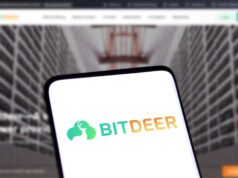TL;DR
- CleanSpark convertible notes raise $1.15 billion with no interest payments to fund AI-ready data centers.
- About $460 million will go toward a share buyback; the rest fuels expansion and debt reduction.
- CleanSpark can redeem the notes from 2029 if its stock trades around $24.91 (130% of the conversion price).
- The company is repositioning from a Bitcoin miner into a broader AI and compute infrastructure provider.
CleanSpark Inc (NASDAQ: CLSK) is taking a bold step to grow beyond Bitcoin mining. The company has raised $1.15 billion through convertible notes, a type of loan investors can later turn into company shares, to finance new AI-ready data centers and energy infrastructure across the United States.
This CleanSpark convertible notes deal, which carries no interest payments until 2032, highlights how mining firms are using Wall Street funding to pivot toward artificial intelligence and high-performance computing (HPC).
How the Financing Works
These 0% notes act as a flexible loan. Investors lend CleanSpark money now and can later convert that debt into shares if the stock price rises above a set level. The notes mature in February 2032 and can be converted into shares at $19.16 each. That’s roughly 27% higher than the company’s stock price when the deal was announced.
CleanSpark also offered an additional $150 million option for investors, which could lift the total deal size to $1.3 billion. This structure lets CleanSpark raise large-scale funding without paying interest each year, which keeps short-term costs low while betting on long-term stock growth.
Where the Money Will Go
The company plans to use $460 million of the funds to buy back its own stock at $15.03 per share, limiting dilution for existing shareholders. The rest, about $670 to $820 million, will be invested in growth projects:
- Expanding its power and land portfolio to support more data centers.
- Building HPC / AI data centers that can handle GPU-based computing, similar to the servers used for training large AI models.
- Paying down earlier loans backed by its Bitcoin reserves.
- General infrastructure spending.
In simple terms: part of the new cash keeps investors happy in the short run, and part funds CleanSpark’s long-term expansion into AI computing.
Why AI Matters for Bitcoin Miners
Bitcoin mining uses large amounts of energy and computing power. Think of it as operating fleets of digital “supercomputers” that verify transactions and earn rewards in Bitcoin. CleanSpark already runs one of the largest such fleets in North America.
But mining is becoming harder and less profitable as competition rises. To stay ahead, CleanSpark is repurposing part of its energy capacity to host AI and high-performance computing clients. That can generate a steadier income than mining alone. Other miners, like Iris Energy and Core Scientific, are doing the same. They are turning their massive power access into data centers that rent computing time to AI developers.
How the Market Reacted
Right after the announcement, CLSK shares fell about 5% in pre-market trading. This drop wasn’t necessarily a vote of no confidence; it’s a common effect when companies issue convertible notes.
Here’s why: some investors hedge by short-selling the stock to balance their risk, temporarily pushing the price down. Analysts said the deal’s zero-interest structure saves CleanSpark money now but could lead to new shares later if the price climbs above $19.16.
The Bigger Picture
Once completed, this financing will give CleanSpark more than $1 billion in new funding. The company expects to finalize the deal by November 13, 2025.
Starting in 2029, CleanSpark can buy back (or “redeem”) the notes if its stock price stays at 130% of the conversion level, about $24.91 per share, for several weeks. By then, its new data centers could be running both Bitcoin mining and AI workloads, positioning it as one of the first hybrid crypto-and-compute companies.
>>> Read more: Crunch Lab Funding: VanEck Backs $5M DeAI Push
Outlook: From Miner to Infrastructure Provider
The CleanSpark convertible notes deal is more than a capital raise, it’s a strategic shift. By using investor loans that can turn into shares, CleanSpark avoids immediate debt pressure while betting on future growth from AI hosting.
In effect, the company is turning its energy-intensive Bitcoin mining operations into an all-purpose digital infrastructure network. If AI demand continues to surge, CleanSpark’s early move could pay off far beyond the next Bitcoin halving.
Readers’ frequently asked questions
What happens to CleanSpark’s stock if the notes are converted into shares later on?
If the share price rises above the $19.16 conversion level, noteholders may choose to convert their notes into equity. This would increase the number of shares outstanding at that time, potentially diluting existing holdings. However, until conversion, the share count does not change.
Why are Bitcoin mining companies turning to convertible notes instead of traditional loans?
Convertible notes let companies raise large amounts of capital without paying ongoing interest, preserving cash during tight-margin periods. Investors accept this because they gain potential upside if the stock performs well and they later convert into shares.
How could CleanSpark’s expansion into AI computing affect its long-term risk profile?
Diversifying into AI and high-performance computing spreads risk beyond Bitcoin mining’s price cycles. Revenue from data-center clients can be steadier than mining rewards, potentially making overall cash flows less volatile over time.
What Is In It For You? Action items you might want to consider
Track CleanSpark’s AI infrastructure rollout
Follow progress on CleanSpark’s new AI and high-performance computing (HPC) facilities. These developments will show how effectively the company transforms its Bitcoin mining capacity into diversified, long-term revenue sources.
Watch for signs of conversion activity
Keep an eye on CleanSpark’s stock price relative to the $19.16 conversion level. If shares approach or surpass that mark, noteholders could begin converting debt into stock, a move that may affect market supply and investor sentiment.
Compare financing strategies among miners
Other Bitcoin miners, such as Iris Energy and Core Scientific, are also using convertible debt to fund growth. Comparing their deal structures, conversion prices, and expansion results can help gauge which miners adapt best to the new AI-driven market cycle.










